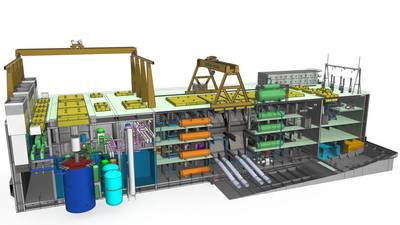BV, ThorCon Developing Molten Salt Nuclear Power Barge
Testing, inspection and certification specialist Bureau Veritas and nuclear power technology developer ThorCon have entered an agreement for the technology qualification and the subsequent development of a 500-megawatt (MW) molten salt nuclear power barge for operations in Indonesia.
The concept developed by ThorCon is a molten salt fission reactor that operates at low pressure and uses liquid fuel. The liquid fuel enables much higher operating temperatures, leading to greater efficiency while also enabling completely passive safety (requiring no action from the operator nor intervention on the power source to stop the reaction). The 500 MW fission power plant will be integrated within a floating barge hull and then towed to a shallow water site before being ballasted to rest on the seabed. The technology will then deliver energy to the power grid to meet land-based energy needs. ThorCon plants will be designed to be mass produced, which will support the transition to carbon free and reliable energy.
ThorCon has entered into discussion with the Indonesian province of Bangka-Belitung, the State Electricity Company PLN, and the Nuclear Energy Regulatory Agency BAPETEN regarding potential sites for the demonstration and the final installation of a 500MW power plant.
BV has been selected to support ThorCon through the Technology Qualification process, both for the nuclear reactor itself and for its encapsulation (enclosed safe compartmentalization allowing the replacement of depleted fuel) and integration with the hull systems.
Experts from Bureau Veritas’ Nuclear Certification Department and from the Marine & Offshore Division will collaborate throughout the process. A key area of work will be to identify the applicable standards, codes and Class Rules, potential gaps with those currently available and the development if needed of new guidance notes and rules.
The scope of the agreement also includes the potential development and deployment phases once the Technology Qualification is completed. At this stage, it is anticipated that the Technology Qualification process will take a minimum of three years and if successful, the deployment phase would require an additional two years.
Laurent Leblanc, Senior Vice President Technical & Operations, Bureau Veritas Marine & Offshore, said, “Nuclear power is increasingly seen as one of the means to achieve global decarbonization and the 1.5°C objectives. New technologies, such as molten salt reactors, open opportunities for the deployment of nuclear energy, power generation in the marine environment being an example. At BV we are proud to be at the forefront of safe innovation, supporting pioneers like ThorCon, by helping them assess the feasibility of new nuclear technology development up to their industrial application. Our role is to assess and address risks to ensure such technologies can be deployed with the highest safety standards. This project is very exciting as it can be a stepping stone to other applications such as the generation of hydrogen offshore and even nuclear ship propulsion.”
Dave Devanney, CEO ThorCon, commented, “ThorCon has developed a 4th generation advanced nuclear reactor design that solves the most perplexing problem of conventional nuclear power: excessive cost. ThorCon is initially implementing its technology in Southeast Asia where the need for low-cost dispatchable carbon-free energy is urgent. Providing a practical clean solution to Southeast Asia’s growing energy needs will significantly slow global warming and climate change.”














